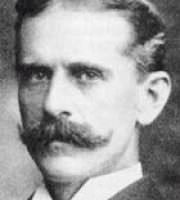by Henry van Dyke
Recited at the Century Club, New York: Twelfth Night. 1906
Come all ye good Centurions and wise men of the times,
You've made a Poet Laureate, now you must hear his rhymes.
Extend your ears and I'll respond by shortening up my tale:-
Man cannot live by verse alone, he must have cakes and ale.
So while you wait for better things and muse on schnapps and salad,
I'll try my Pegasus his wings and sing a little ballad:
A legend of your ancestors, the Wise Men of the East,
Who brought among their baggage train a quaint and curious beast.
Their horses were both swift and strong, and we should think it lucky
If we could buy, by telephone, such horses from Kentucky;
Their dromedaries paced along, magnificent and large,
Their camels were as stately as if painted by La Farge.
But this amazing little ass was never satisfied,
He made more trouble every day than all the rest beside:
His ears were long, his legs were short, his eyes were bleared and dim,
But nothing in the wide, wide world was good enough for him.
He did not like the way they went, but lifted up his voice
And said that any other way would be a better choice.
He braced his feet and stood his ground, and made the wise men wait,
While with his heels at all around he did recalcitrate.
It mattered not how fair the land through which the road might run,
He found new causes for complaint with every Morning Sun:
And when the shades of twilight fell and all the world grew nappy,
They tied him to his Evening Post, but still he was not happy.
He thought his load was far too large, he thought his food was bad,
He thought the Star a poor affair, he thought the Wise Men mad:
He did not like to hear them laugh,-'twas childish to be jolly;
And if perchance they sang a hymn,-'twas sentimental folly!
So day by day this little beast performed his level best
To make their life, in work and play, a burden to the rest:
And when they laid them down at night, he would not let them sleep,
But criticized the Universe with hee-haws loud and deep.
One evening, as the Wise Men sat before their fire-lit tent,
And ate and drank and talked and sang, in grateful merriment,
The solemn donkey butted in, in his most solemn way,
And broke the happy meeting up with a portentous bray.
"Now by my head," Balthazar said (his real name was Choate),
"We've had about enough of this! I'll put it to the vote.
I move the donkey be dismissed; let's turn him out to grass,
And travel on our cheerful way, without the solemn ass."
The vote was aye! and with a whack the Wise Men drove him out;
But still he wanders up and down, and all the world about;
You'll know him by his long, sad face and supercilious ways,
And likewise by his morning kicks and by his evening brays.
But while we sit at Eagle Roost and make our Twelfth Night cheer,
Full well we know the solemn ass will not disturb us here:
For pleasure rules the roost to-night, by order of the King,
And every one must play his part, and laugh, and likewise sing.
The road of life is long, we know, and often hard to find,
And yet there's many a pleasant turn for men of cheerful mind:
We've done our day's work honestly, we've earned the right to rest,
We'll take a cup of friendship now and spice it with a jest.
A silent health to absent friends, their memories are bright!
A hearty health to all who keep the feast with us to-night!
A health to dear Centuria, oh, may she long abide!
A health, a health to all the world,-and the solemn ass, outside!
Last updated January 14, 2019




